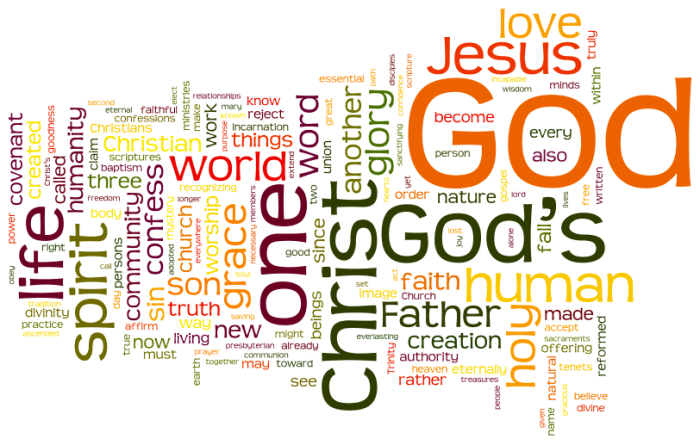The concluding subsections of Section III of the Draft, "Essentials of the Reformed Tradition," under "Essential Tenets" points to both the possibilities of and obstacles to dialogue between the self-styled evangelical and progressive wings of the church. Those subsections include: C, "Covenant life in the church," D, "Faithful stewardship of all of life," and E, "Living in obedience to the Word of God." Let's take the obstacles first. These subsections twice touch on the question of homosexuality by defining the God-created relationships we should live in as being between men and women and by defining marriage as being between a man and a woman. The definition of marriage appears in the Draft's commentary on the Ten Commandments (in Section E, "Living in obedience to the Word of God"), which do not themselves actually so define marriage. The Commandments merely charge us to not commit adultery or to covet our neighbor's wife. Homosexuality,in any event, is the latest issue we fight about and walk away from each other over. And that's the one clear obstacle between us, at least so far as these three subsections are concerned. There are other points over which to dialogue, again especially the Draft's very low view of humanity. But the one clear obstacle to dialogue (and, apparently, reconciliation) is the possibility that homosexuals can be ordained in the PC(USA).
On the other hand, there is much that unites us. In the second paragraph of subsection C, for example, the Draft eloquently affirms diversity in humanity and the church as being created in us by God. In subsection D, the Draft affirms the right of women to full participation in "all ministries of the Church." In subsection E, the Draft's brief commentary on the Ten Commandments, mentioned above, contains some very good commentary. I, personally, find its description of the Sixth Commandment particularly apt. It states that those adhering to the Draft will hold each other accountable to, "eradicate a spirit of anger, resentment, violence, or bitterness, and instead cultivate a spirit of gentleness, kindness, pace, and love." If Presbyterians of various persuasions had treated each other by this principle, our present would have looked very different from what it does today. In general, there is very little with which I would argue in these three sections and much that I would affirm without reservation.
Indeed, that fact suggests an important reason why the separatist faction of the Fellowship seems bent on forming yet another Reformed denomination rather than hooking up with one of the more conservative ones that many individual disaffected PC(USA) churches have joined in the past. The hardcore evangelicals, the ones who cannot abide the ordination of women, for example, have already left PC(USA), most of them long ago. Those who are going to leave now, apparently, have "bought into" a less absolutist expression of evangelical faith, one that allows for more diversity and even for embracing elements, notably women's ordination, that are clearly prohibited by a literalist reading of the Bible. Were it not for the ordination of homosexuals.... But, that is today's hot button, we will not tolerate dissenting views issue—for progressives as well as evangelicals.
One wonders what those of us who are left will argue about next. One wonders what those who leave will find to fight about after they leave. Oh well.
The final paragraph of the chapter on essential tenets (p. 9) merits a special note. It reads,
In Jesus Christ we see the perfect expression of God’s holy will for human beings offered to God in our place. His holy life must now become our holy life. in Christ, God’s will is now written on our hearts, and we look forward to the day when we will be so confirmed in holiness that we will no longer be able to sin. As the pioneer and perfecter of our faith, Jesus leads us along the path of life toward that goal, bringing us into ever deeper intimacy with the Triune God, in whose presence is fullness of joy.OK. Yes. But I would like to suggest another of my "minor" adjustments, this time to the words "perfect" and "perfecter of our faith." The concept of "perfection" has nothing to do with our human experience other than the fact that there is no such thing as "perfect" in our real world. God, again as best I can tell on the basis of the process of creation as we know it to be through science, doesn't create perfect things but, rather, things laden with potential and programmed to evolve. I would thus like to suggest as an alternative reading, first, "In Jesus Christ we see the full expression of God's holy will..." Those for whom "full" means perfect can read it in that way. Those for whom "full" means that God has set Christ as guidepost of the direction in which we are headed can read "full" in that way. In place of "perfecter of our faith," I would suggest "model of our faith" for much the same reasons. And I would thus whole-heartedly agree that Jesus leads us into a future just as the Draft states it. Our faith can never be perfect so long as we are human so Jesus as "perfecter" of our faith points to something we cannot attain, namely perfect faith. As the "model" for our faith, Jesus sets before us a goal, a direction that one day by the grace of God we just might attain—and we will call it the Kingdom of God.
This isn't just playing with words. Perfection is a trap. Fullness is a hope. Amen.

